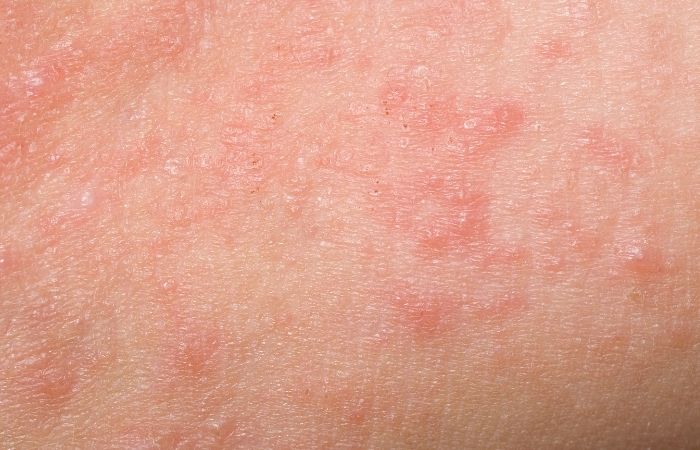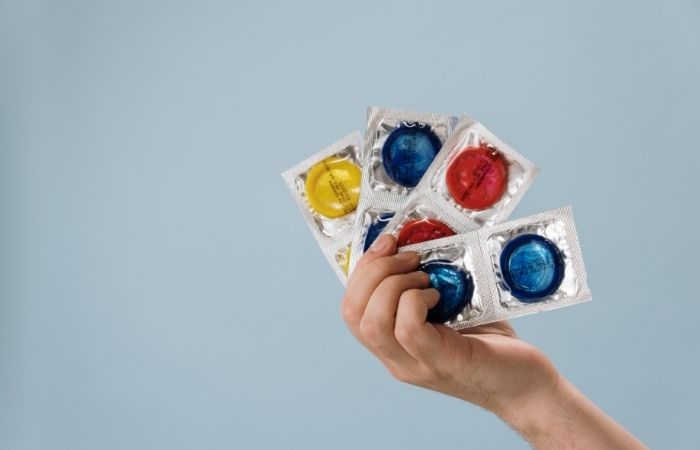Is Oral Sex Safe? Why You Can Still Catch STDs Without Penetration
Quick Answer: Yes, you can get chlamydia without penetration. It can be transmitted through oral sex, shared sex toys, digital play (like fingering), and even possibly contaminated objects, though that’s far less common.
This Isn’t Just Razor Burn, And Here’s Why
Let’s start with what drives people to Google questions like, “Can you get chlamydia from a towel?” or “STD from fingering?” It usually starts with symptoms that don’t make sense. A little burning while you pee. A weird discharge. A sore throat that won’t go away. No penetration. No ejaculation. No new partner, maybe. And yet, something’s off.
Chlamydia can absolutely show up after activities that don’t involve what most people define as “real sex.” The bacteria Chlamydia trachomatis doesn’t care whether you had vaginal, anal, or oral intercourse. It just needs access to a mucous membrane, your mouth, genitals, rectum, or eyes. This is why throat symptoms like mild soreness, irritation, or that “I’m-coming-down-with-something” feeling could actually be an oral chlamydia infection. According to the CDC, many infections are asymptomatic, but when signs do show up, they’re often vague and easy to misattribute.
So yes, if you’re feeling something weird but didn’t have traditional sex, you’re not imagining things. Your body may be trying to tell you something, even if your sex life doesn't “qualify” as risky in your mind.

People are also reading: STD Symptoms in Pregnancy, When Spotting & Fatigue Don’t Feel Right
But We Didn’t Even Have Sex, The Myth That Keeps People Silent
In sexual health clinics, this is one of the most common confessions: “But I didn’t even really have sex.” It’s usually said quietly, almost in disbelief, by people who just got diagnosed with an STI like chlamydia. It happens to queer women who used a toy between partners. To straight men who received oral and thought it was safe. To monogamous folks who didn’t realize their partner’s past exposures could still impact them.
The myth that only penetration equals “sex” is not just inaccurate, it’s dangerous. It stops people from getting tested because they assume they’re not at risk. It feeds shame when someone tests positive and can’t figure out how. It leaves entire groups, like queer women, trans people, and anyone having non-penetrative sex, out of the risk conversation.
But the science is clear. Studies show that STIs like chlamydia can be passed during oral sex, through fingers, or via shared objects that haven’t been properly sanitized. In one study from the Sexually Transmitted Diseases journal, researchers documented chlamydia cases in individuals who reported zero penetrative sex. Some had only engaged in oral sex. Others had used fingers or sex toys. All tested positive.
Chlamydia isn’t a moral punishment. It’s a bacterium. And it doesn’t give a damn how careful or “good” you’ve been. This is where it gets both fascinating and infuriating.
Let’s walk through how this actually happens, using real-world scenarios.
Imagine a hookup. One person has chlamydia and doesn’t know it. During mutual masturbation, they use fingers or a toy on themselves, then on their partner, without washing or changing condoms. That’s direct transmission. Mucous membranes in the vulva or urethra can absorb the bacteria just like they would during penetrative sex.
Now take oral sex. If someone with a throat infection goes down on you, or vice versa, the bacteria can transfer via saliva or direct contact. The CDC and NHS both recognize oral chlamydia as a real and rising issue, especially among young adults and men who have sex with men. And yet, it’s rarely tested unless you ask specifically for a throat swab.
Then there’s the toy question, an issue often ignored in mainstream sexual health. Shared toys without proper cleaning or barrier use (like condoms) can absolutely carry infectious bacteria from one partner to another. Chlamydia can survive on surfaces for a short window of time, and sex toys provide warm, moist environments where that window might be long enough to cause transmission.
So while towels or toilet seats are extremely low risk and not worth obsessing over, sex toys, unwashed hands, and oral sex? They’re worth talking about.
Next: why none of this means you're dirty, and how to take control again.
You’re Not Dirty, You’re Just Human
Let’s get this out of the way: contracting chlamydia, or any STI, doesn’t make you reckless, dirty, or broken. It makes you human. That’s it. You’re navigating intimacy in a world where most people carry something at some point, often without knowing. According to CDC prevalence reports, chlamydia remains the most commonly reported bacterial STI in the U.S., with over 1.6 million cases in 2022 alone. Many of those people had no symptoms. Some had no penetrative sex. Most didn’t “do anything wrong.”
We’ve got to stop tying infections to morality. One of the most dangerous things chlamydia spreads with is shame. And shame makes people hide. It stops people from getting tested. It keeps partners in the dark. It slows treatment, which increases the risk of complications like pelvic inflammatory disease (PID) or infertility, not because the bacteria is super powerful, but because it got ignored.
In one online forum, a woman recounted being ghosted after telling a partner about her positive result.
“He acted like I gave him a death sentence,” she wrote. “But the truth is, I probably got it months ago from oral, and neither of us knew.”
Her post wasn’t rare. Stories like hers flood comment sections and advice columns. The fear isn’t just the infection, it’s the reaction. That has to change. You are not your STI. You’re someone who trusted, experimented, got curious, or just lived your life, and now you deserve clarity, not judgment.
How Long Can Chlamydia Live on Surfaces, Really?
This question, “Can you get chlamydia from a towel?”, is surprisingly common. And the answer is: almost certainly not. But let’s dig into what “almost” means.
Chlamydia is a fragile bacterium. It needs a host to survive and reproduce. Once it’s outside the body, on a towel, toilet seat, or sheet, it doesn’t live long. Some studies suggest chlamydia may persist on plastic surfaces under lab conditions for up to 2–3 hours, but actual transmission from objects remains extraordinarily rare. No strong evidence shows people getting infected from towels or toilet seats in real-life conditions. But sex toys? That’s different.
Because sex toys go inside bodies, they create the perfect environment for chlamydia to hang out, warm, moist, and full of mucous membrane contact. If those toys aren’t cleaned thoroughly or covered with a condom between uses or partners, the bacteria can be passed like a handoff. In fact, research published in the Journal of Infectious Diseases found that infectious STIs including chlamydia, gonorrhea, and trichomoniasis can survive on sex toys for up to 24 hours if not disinfected correctly.
So while you don’t need to panic over your bath towel, you do need to clean your toys. And your hands. Every time.
Sex Without Condoms Isn’t Just Vaginal or Anal
Let’s talk about the gaps in the condom conversation. Most people think condoms = penis-in-vagina protection. That’s part of it. But they’re also one of the best tools we have for preventing oral chlamydia and toy-based transmission, and most people aren’t using them that way.
Dental dams, latex gloves, and condoms on toys are not just “kinky” tools. They’re protective tools. And they don’t have to kill the mood. Use flavored condoms for oral. Keep gloves bedside for mutual masturbation. Cut a condom into a dam for cunnilingus. Is it more effort? Sure. But if you’re dealing with recurring STIs, or want to avoid the uncertainty of what happened that night, a little prep can go a long way toward peace of mind.
One Reddit user wrote,
“After my third chlamydia scare, none from PIV sex, by the way, I finally started using condoms on toys. It changed everything.”
That’s the kind of energy we need: not shame-driven, but sex-positive and proactive. It’s not about paranoia. It’s about information. It’s about deciding for yourself what risks are worth taking, and having the tools to reduce the ones you don’t want to take again.

People are also reading: Safe Sex Isn’t Just for the Young: Seniors and STI Prevention
“I Treated It, Why Did It Come Back?”
Here’s another thing people Google late at night: “Can you reinfect yourself with chlamydia?” It’s usually after they’ve been treated, felt better, and then, weeks or months later, felt symptoms again. The answer is complicated. Technically, you can’t reinfect yourself once the infection is fully treated and cleared. But that assumes everything else is equally treated too, your partners, your toys, your practices.
Let’s say you got treated but didn’t realize your favorite toy also carried the bacteria. You used it again. Or maybe your partner didn’t follow through on their prescription. Or you had oral sex with someone else who had no clue they were positive. Boom, “reinfection” that isn’t your fault, but still hits your body just the same.
The National Institutes of Health reports that re-infection rates for chlamydia can be as high as 20% within the first few months, especially among young adults. That’s not because people are irresponsible, it’s because we’re not talking enough about nontraditional transmission routes, proper cleaning, and follow-up testing.
If you’ve been treated for chlamydia, the CDC recommends retesting three months later, even if you have no new partners. And if you’re getting repeat positives despite no obvious exposures? Talk to your provider about testing for oral, rectal, and genital sites separately. You might be missing something that a standard urine test doesn’t catch.
If this article has you spiraling, pause. This isn’t about creating panic. It’s about giving you permission to trust your instincts. If something feels off in your body, it probably is. And you don’t have to wait for a partner, or a doctor’s office, to validate that.
Today, you can get tested for chlamydia (and other common STIs) discreetly, affordably, and on your terms. At-home testing kits are lab-certified and detect infections with the same accuracy as clinical tests. You collect your sample, urine, throat swab, or rectal swab depending on your risk, and ship it back. Some even give results in under 30 minutes without lab delays.
This isn’t just about results. It’s about relief. Clarity. The power to say, “I know my status”, even if you haven’t had what the world calls “sex.”
So What Now? Living (and Loving) After Chlamydia
Recovery doesn’t stop at antibiotics. It includes your mental health, your confidence, your next moves. You’re allowed to feel angry. Or confused. Or scared to date again. You’re also allowed to feel nothing, because not every diagnosis is an emotional earthquake.
Some people bounce back and make safer sex plans the next day. Others take a break from dating entirely. There’s no right way to respond. But one thing that helps? Talking about it. With friends. With partners. With your past self, if needed. The more we normalize STI conversations, the easier it becomes to manage them. And manage them we must, because STIs aren’t going anywhere. But neither is your power to stay informed, protected, and respected.
One queer couple interviewed in a VICE article said they discussed testing on their third date. Not because one of them had symptoms, but because they knew what it meant to care for each other. That’s what testing is. Not fear. Not dirtiness. Care.
Your sex life doesn’t end with an STI. In fact, it might just begin with more honesty, more control, and more freedom than ever before.
Stick with us, next, we wrap it all up with FAQs, takeaways, and source links.
FAQs
1. Wait, can I seriously get chlamydia just from fingering?
Yes, but it’s less about the fingers and more about what’s on them. If someone has chlamydia and they touch themselves, or you touch them, and then those same fingers go inside your body, the bacteria can spread. Add lube, heat, micro-tears, and boom: transmission highway. It’s not common, but it happens.
2. Do I really need to use condoms on sex toys?
If you're sharing them between people or switching holes, hell yes. That sleek silicone wand you love? It can hold onto bacteria longer than you think. Covering toys with a condom (and swapping them between uses) is the easiest STD-proofing hack you’re probably not doing. Bonus: way easier cleanup.
3. I haven’t had “real” sex. How did I get chlamydia?
Let’s redefine “real.” If there was oral, hands, toys, or grinding with fluids involved, that’s enough. Chlamydia just needs access to your mucous membranes, it doesn’t need a penis or a deep thrust. Trust us: you're not the first to say, “But we didn’t even have sex!” in a clinic waiting room.
4. Can I get it from oral sex if nobody came?
Yep. Ejaculation isn’t required. Just the presence of the bacteria in saliva, vaginal fluid, or pre-cum is enough. It’s sneaky like that. That mild sore throat you thought was allergies? Sometimes it’s chlamydia. If you’re having oral sex, even just giving, you could be exposed.
5. Should I be worried about towels or toilet seats?
Nah. That’s mostly urban legend territory. Chlamydia doesn’t survive long on dry surfaces, and your skin barrier is solid. Focus your energy on cleaning toys, washing hands between partners, and using barriers, not policing your bathroom linen closet.
6. Why didn’t I have any symptoms?
Because chlamydia is a silent little gremlin. Most people don’t feel a thing, especially in the throat or rectum. That’s why so many infections go undetected until someone gets tested after a partner’s diagnosis. Testing regularly is self-care, not overkill.
7. I treated it, so why did it come back?
Could be reinfection from an untreated partner. Could be a site that wasn’t tested, like your throat or rectum. Could be a shared toy that didn’t get sanitized. The antibiotic only clears what it reaches, so if something got left out, you might see a repeat performance.
8. Do I need to test even if I only do oral?
If oral is part of your routine, then yep, include it in your testing plan. Ask for a throat swab or choose an at-home kit that lets you target specific sites. You deserve accuracy, not a generic “all clear” that misses where the bacteria might be hiding.
9. How soon after a hookup should I test?
If you’re feeling anxious, wait at least 1–2 weeks for chlamydia to show up reliably. But don’t stop there, retest three months later to make sure you didn’t miss a silent infection. And always test again before new partners or after anything unprotected.
10. Will I have to tell everyone I’ve ever hooked up with?
No, just the people you’ve had contact with since your last negative test, or anyone you think might’ve been involved during the window of risk. It’s not about retroactive shame. It’s about breaking the chain. You can even tell them anonymously through services like TellYourPartner.org.
You Deserve Answers, Not Assumptions
If there’s one thing we hope you take from this, it’s that you’re not alone, and you’re not to blame. Chlamydia doesn’t care whether you had sex the “right” way or any way at all. It just needs a moment of contact, a bit of biology, and silence to spread. But you don’t have to stay silent.
Whether it’s a weird throat tickle, a feeling of betrayal, or just wanting peace of mind, you deserve answers. And getting tested is one of the most powerful things you can do. It means you’re taking care of yourself. It means you're showing up informed and ready, for partners, for pleasure, for the life you want. Don’t wait and wonder, get the clarity you deserve.
Sources
2. NIH – Chlamydia Reinfection Study
4. CDC – How Is Chlamydia Spread?
5. Cleveland Clinic – Can Chlamydia Spread via Sharing Sex Toys?







